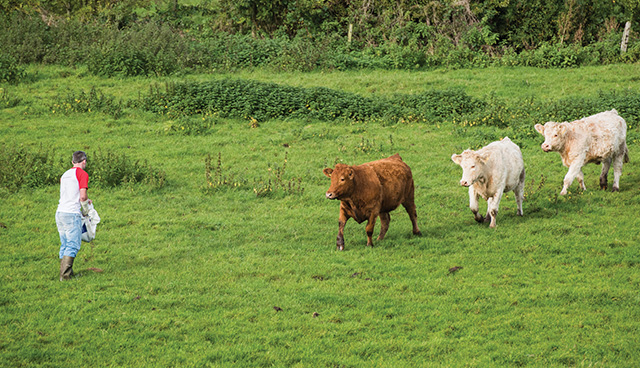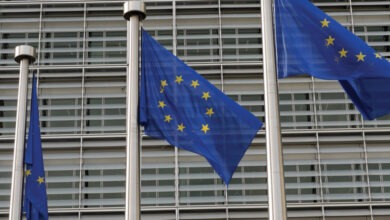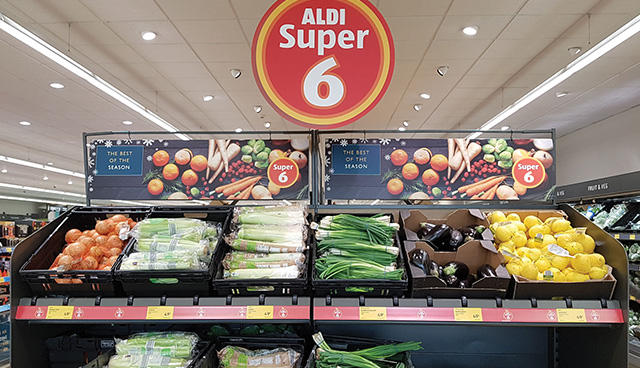Commitment to all-island agriculture policy


Sinn Féin’s priorities for agriculture are driven by the party’s commitment to an all-island perspective on all aspects of policy.
East Derry MLA Caoimhe Archibald reflects this perspective succinctly when speaking at a recent Brexit conference. Archibald believes that securing special designated status for Northern Ireland within the European Union must be a priority to maintain the agri-food industry across the entire island.
She says: “Currently the North implements the EU Common Agriculture Policy but it is generally accepted that the British Tory administration does not place the same priority on the importance of agriculture as the EU.
“Throughout the EU there are other member states whose economies, like our own, have a high dependency on agriculture. There must not be any removal of powers on agriculture.
“Given the importance of farming and agri-food to Ireland north and south, and the cross-border nature of the industry, greater harmonisation and cooperation of agriculture policy on an all-island basis must be pursued.”
MEP Martina Anderson has taken this principle one step further by calling for an integrated agricultural administration system on the island of Ireland.
She says: “Our agriculture industry on this island is recognised internationally for its excellence and the international community does not see borders when it comes to our produce.
“Given the challenges we face with Brexit, particularly in agriculture, it is vital that the farming sector starts preparing for Irish unity. An integrated agricultural administration system on the island of Ireland would remove trade barriers, obstacles around country of origin labelling, and differing animal health regulations.
“Irish unity makes sense for our agri-food and farming sectors north and south and we need to start preparing for it now.”
A core plank of Sinn Féin’s farm policy, where Brexit is concerned, is the need for the Irish government to establish a €10 million support fund. This would be designed to assist small businesses and farmers in assessing and preparing themselves for Brexit.
Sinn Féin spokesperson for Agriculture, Food and Marine Martin Kenny TD believes that such a fund will also provide for the expansion of current enterprise programmes in order to provide all required assistance to SMEs, including those in the agri-food industry.
“The current Action Plan for Rural Development also commits to carrying out specific research on the impact of Brexit on rural Ireland, yet to date this has not been carried out,” he says.
“Sinn Féin believes that this research must commence without further delay in order to obtain a comprehensive overview of the challenges faced by rural communities with regards to Brexit and to ensure appropriate planning can take place to mitigate negative consequences.”
Looking to the future, Sinn Féin wants to see a Common Agricultural Policy (CAP) review that delivers greater equity for Irish farmers. This comes with the caveat that no cuts to the EU’s farm support budget will be tolerated.
MEP Matt Carthy points out that farm organisations, the Irish government and rural representatives across Europe must prepare for a battle if significant cuts to the CAP budget are to be avoided.
Carthy, a member of the European Parliament’s Agriculture and Rural Development Committee, says: “The European Commission is seeking cuts to the overall EU budget and clearly farmers are in their sights. Current indications are that these cuts could take the form of a 5 to 10 per cent reduction in agriculture and cohesion spending.
“It is true the CAP budget is facing increased pressure due to the potential €4 billion hole following Brexit; but farmers cannot pay the price twice – once in a cut to direct payments and again in possible barriers to trade with the UK.”
He adds: “Only 6 per cent of EU farmers are under 35. Every new slash to farm income prospects reinforces a message to young people that there is no future in farming. As farmers face increasing pressure to make farming practices sustainable, the communities that depend on local agriculture also face uncertain prospects.
“Minister Creed has acknowledged the difficulty when he said: ‘we can have all of the lofty ambitions for the Common Agricultural Policy, but if we don’t have the budget, they’re but pipe dreams really’.
Carthy makes it clear that Sinn Féin is opposed to any proposed reduction of the CAP budget: “We will vigorously campaign for greater equity in payments to Irish farmers. The current situation whereby 80 per cent of the CAP budget is directed at the 20 per cent of highest earners is unsustainable and actually weakens our arguments in support of farm subsidies.
“It is beyond question now that the CAP budget is under threat. If that threat is to be withstood then a concerted campaign by farm organisations, the government and all rural representatives is required.”
A pending free trade deal between the European Union and the Mercosur group of South American countries, which includes Brazil, is another concern for the Sinn Féin leadership.
“Many beef farmers in Ireland are extremely concerned that this deal will open up the export of 100,000 tonnes of beef from Latin America to Europe. That will be a huge threat to our beef sector,” says Kenny.
“The Programme for a Partnership Government also has a commitment to the United Nations sustainable development goals. Producing this beef in Latin America means cutting away the rain forests. There is also an environmental impact resulting from this.
“It is absolutely vital that the Irish government rejects this deal and does everything it can to ensure that the European Union does so.”
Sinn Féin policy makers believe that agriculture can play a key role in allowing Ireland meet its greenhouse gas emission targets. However, they do not believe that a Carbon Tax should be imposed on farmers, in order to make this happen.
Kenny has described the recommendations of the Citizens Assembly to tax greenhouse gas emissions from agriculture as ludicrous: “There is no evidence to suggest that the introduction of carbon taxes reduce carbon emissions, on the contrary since the introduction of a carbon tax on fossil fuels in 2010 over all greenhouse gas emissions have increased by 4 per cent,” Kenny says.
“If a tax on greenhouse gas emissions on agriculture were to be introduced, I don’t see it having any effect on the overall levels of carbon emissions. It will however have a serious impact on the price of food for consumers in shops.
“To suggest that we need to move away from beef production to an alternative farming practice like forestry is completely ludicrous.”
He adds: “The agri-food industry is one of the largest sources of employment in the country and also accounts the largest percentage of Irish exports. The notion that we should move to an alternative farming practice like forestry would have a devastating effect on the Irish economy.
“While I agree it is important to reduce greenhouse emissions, we need to find an alternative way other than taxing people as it simply doesn’t work.”






